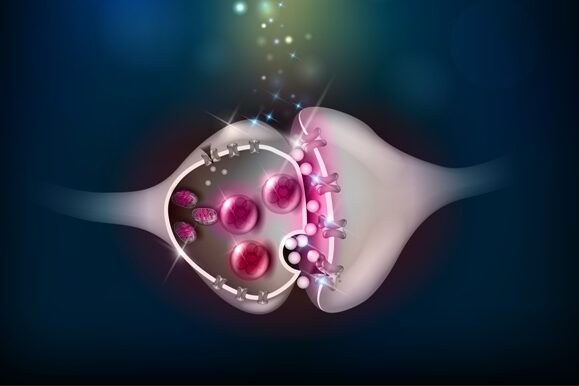Insulin and dopamine
In the human brain, the hormone insulin also acts on the most important neurotransmitter of the reward system, dopamine. This was demonstrated by researchers at the German Center for Diabetes Research (DZD) in Tübingen. Insulin reduces the level of dopamine in a specific region of the brain (striatum *) that regulates reward processes and cognitive functions, among other things. This interaction may be an important driver of the brain regulation of glucose metabolism and eating behavior. The study has been published in the Journal of Clinical Endocrinology & Metabolism.
Around the globe, people are increasingly developing obesity and type 2 diabetes. Studies show that the brain plays an important role in the onset of these diseases. Dopamine is the most important neurotransmitter of the reward system. The hormone insulin is released after eating and regulates metabolism in the human body (homeostatic system). It is not yet known how these two systems interact. Nevertheless, changes in these systems have been linked to obesity and diabetes.
The study
In the current study, researchers from the Research Institute of Diabetes and Metabolic Diseases (IDM) in the Helmholtz Zentrum München at the University of Tübingen, a partner of the DZD, and the University Hospital of Tübingen (Innere IV, Director: Prof. Andreas Birkenfeld) examined how the two systems interact specifically in the brain’s reward center, the striatum.
“Our eating behavior is regulated by the interaction of the reward system and the homeostatic systems. The research indicates that insulin also acts on dopamine-driven reward centers in the brain. Obesity has also been shown to lead to changes in brain signaling that have a negative effect on glucose metabolism throughout the body,” first author Stephanie Kullmann affirmed. “Now we wanted to figure out the interaction between the two systems in humans and find out how insulin regulates the dopamine system.”
For this purpose, 10 healthy men of normal weight received insulin or a placebo via nasal spray (randomized, placebo-controlled, blind crossover study). When insulin is absorbed through the nose, it goes directly to the brain. To study the interaction between insulin and dopamine, the researchers used a unique measurement technique: they combined MRI to assess functional brain activity and positron emission tomography to assess dopamine levels.
The findings
The data of the study showed that intranasal administration of insulin lowered dopamine levels and caused changes in the brain’s network structure. “The study provides direct evidence of how and where brain signals that are activated after eating, such as insulin release and the reward system, interact,” Professor Martin Heni – last author of the study – said, summarizing the results. “We were able to show that insulin is capable of lowering dopamine levels in the striatum in normal-weight individuals. The insulin-dependent change in dopamine levels was also associated with changes in functional connectivity in brain-brain networks. Changes in this system can be a major driver of obesity and related diseases.”
The future
In future studies, the researchers want to look at changes in the interaction of dopamine and insulin in obese or diabetic participants. These people often suffer from insulin resistance in the brain. Therefore, the researchers assume that this resistance prevents the normal regulation of dopamine levels induced by insulin in the reward center. In later stages, they want to restore the normal action of insulin in the brain through behavioral and/or pharmaceutical interventions.
* The striatum belongs to the human brain and is a part of the basal ganglia. It is a central connection point for various neural pathways as well as control circuits, and plays a role in the mechanism that connects motivation, reward, emotions, movement behavior, and numerous cognitive functions.
Link: https://www.sochob.cl/web1/la-insulina-en-el-cerebro-influye-en-los-niveles-de-dopamina/
Date: November 29th, 2021
Source: https://www.sciencedaily.com
Reference: Kullmann S, Blum D, Jaghutriz BA, et al. Central insulin modulates dopamine signaling in the human striatum. J Clin Endocrinol Metab 2021;106:2949-2961.
Nutrigenomics Institute is not responsible for the comments and opinions included in this article






